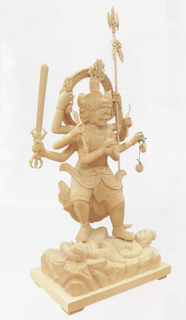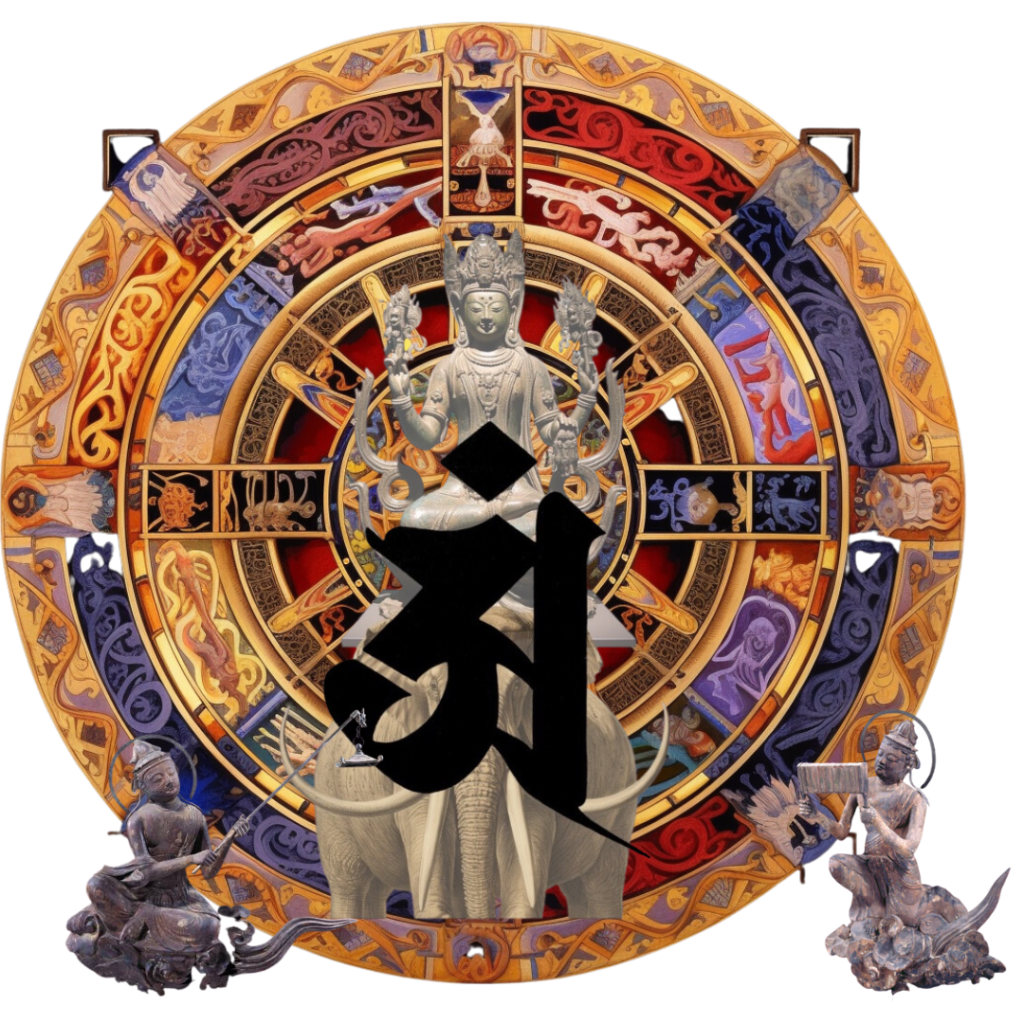
降三世はサンスクリット語で、トライローキヤ・ヴィジャヤ(三界の勝利者 Trailokyavijaya)といい、正確には「三千世界の支配者シヴァを倒した勝利者」の意味。
経典によっては、そのまま、孫婆明王(そんばみょうおう)とも、後期密教の十忿怒尊ではシュンバ・ラージャ (Śumbharāja)とも呼ばれる。 その成立は、古代インド神話に登場するシュンバ (Śumbha)、ニシュンバ (Niśumbha) というアスラの兄弟に関係し、密教の確立とともに仏教に包括された仏尊である。
同体とされる勝三世明王は、降三世と起源を同じくするものの、「一面二臂タイプのトライローキャヴィジャヤ」として近年インドでも出土しており、ヴァジュラ・フーンカーラ菩薩 (Vajrahūṃkāra) とも言われる
シヴァは妻のパールヴァティーと共に「過去・現在・未来の三つの世界を収める神」としてヒンドゥー教の最高神として崇拝されていたが、大日如来はヒンドゥー教世界を救うためにシヴァの改宗を求めるべく、配下の降三世明王を派遣し(或いは大日如来自らが降三世明王に変化して直接出向いたとも伝えられる)、頑強難化のシヴァとパールヴァティーを遂に超力によって降伏し、仏教へと改宗させた。降三世明王の名はすなわち「三つの世界を収めたシヴァを下した明王」という意味なのである。
降三世明王は右の絵の通り四面八臂[11]の姿をしており、二本の手で印象的な「降三世印」を結び、残りの手は弓矢や矛などの武器を構える勇壮な姿であるが、何より両足で地に倒れた大自在天(シヴァ)と妻烏摩妃(パールヴァティー)を踏みつけているのが最大の特徴である。誰かを踏みつけた仏と言えば四天王がそれぞれ邪鬼を踏みつけているが、降三世明王は「異教とはいえ神を倒して踏みつけている」という点でひと際異彩を放つ仏である。
真言
- オン・ニソムバ・バサラウンパッタ
- Oṃ śumbha niśumbha hūṃ gṛhṇa gṛhṇa hūṃ gṛhṇāpaya hūṃ ānaya ho bhagavan vajra hūṃ phaṭ.
- (オーン、シュンバよ、ニシュンバよ、フーン、捕えよ、捕えよ、フーン、捕えしめよ、フーン、引き入れよ、ホー、世尊よ、金剛よ、フーン、パット
- )
- One of the Five Great Meiou or the Eight Great Meiou. It is distributed to the east. An incarnation of Akshobhya. It surrenders and refuses the three poisons and anxieties of Tonjinchi, and the two obstacles of knowledge. There are eight-armed, four-armed, and two-armed statues, but most are eight-armed, and there are three and four sides. He tramples on Daijuten and his princess, Karasuma, and holds a sword and a pestle in his hand. Benefits include subjugation, victory, illness, and respect. Trailokyavijaya.Trailokyavijaya is a Sanskrit word for Trailokyavijaya, which means "the victor who defeated Shiva, the ruler of the three thousand worlds."
Depending on the scriptures, it is also called Sonba Myouou or Shumba Raja in the late esoteric Buddhism. Its formation is related to the Asura brothers Śumbha and Niśumbha, who appear in ancient Indian mythology, and is a Buddhist priest who was included in Buddhism with the establishment of esoteric Buddhism.
Although it has the same origin as Trailokyavijaya, it has been excavated in India in recent years as a "one-sided, two-armed type trilo cavijaya," and is also known as the Vajrahūṃkāra.
Shiva was worshiped as the supreme god of Hinduism as "the god that houses the three worlds of the past, present and future" with his wife Parvati, but Dainichi Nyorai calls for the conversion of Shiva to save the Hindu world. In order to do so, he dispatched his subordinate, Trailokyavijaya (or it is said that Dainichi Nyorai himself changed to Trailokyavijaya and went directly), and finally surrendered the stubborn Shiva and Parvati by super power and went to Buddhism. Was converted. The name of the descending third generation Myo is, in other words, "the Myo who defeated Shiva containing the three worlds."
As shown in the picture on the right, the trailokyavijaya has the appearance of four sides and eight arms [11], with two hands tying the impressive "Trailokyavijaya", and the remaining hands holding weapons such as bows and arrows and halberds. It is a brave figure, but the biggest feature is that it is trampling on Shiva and Parvati, who have fallen to the ground with both feet. Speaking of Buddha who trampled someone, the four heavenly kings are trampling on evil spirits, but the King of the Third King is a Buddha that stands out in that "although it is pagan, it is trampling on God."
Mantra
On Nisomba Basaraunpatta
Oṃ śumbha niśumbha hūṃ gṛ hṇ a gṛ hṇ a hūṃ gṛ hṇāpaya hūṃ ānaya ho bhagavan vajra hūṃ phaṭ.
(Oh, Shumba, Nishumba, Hoon, Catch, Catch, Hoon, Catch, Hoon, Pull in, Ho, Seiko, Kongo, Hoon, Pat)
【このカテゴリーの最新記事】
-
no image
-
no image
-
no image
-
no image
-
no image





